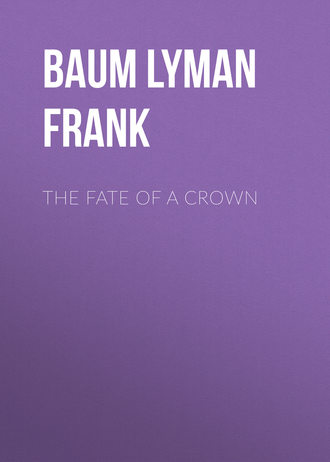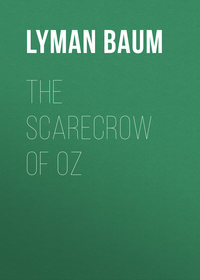 полная версия
полная версияThe Fate of a Crown
On the third morning after my arrival I was strolling down the street toward the railway station, in company with Mazanovitch, when suddenly I paused and grasped my comrade’s arm convulsively.
“Look there!” I exclaimed.
Mazanovitch shook off my hand, impatiently.
“I see,” he returned; “it is the Senhorita Lesba Paola, riding in the Emperor’s carriage.”
“But that scoundrel Valcour is with her!” I cried.
“Scoundrel? We do not call Senhor Valcour that. He is faithful to the Emperor, who employs him. Shall we, who are unfaithful, blame him for his fidelity?”
While I sought an answer to this disconcerting query the carriage whirled past us and disappeared around a corner; but I had caught a glimpse of Lesba’s bright eyes glancing coyly into the earnest face Valcour bent over her, and the sight filled me with pain and suspicion.
“Listen, Captain,” said I, gloomily, “that girl knows all the important secrets of the conspiracy.”
“True,” answered the unmoved Mazanovitch.
“And she is riding in the Emperor’s carriage, in confidential intercourse with the Emperor’s spy.”
“True,” he said again.
“Paola has disappeared, and his sister is at court. What do you make of it, senhor?”
“Pardon me, the Minister of Police returned to his duties this morning,” said the man, calmly. “Doubtless his sister accompanied him. Who knows?”
“Why did you not tell me this?” I demanded, angrily.
“I am waiting for Paola to communicate with us, which he will do in good time. Meanwhile, let me counsel patience, Senhor Americano.”
But I left him and strode down the street, very impatient indeed, and filled with strange misgivings. These Brazilians were hard to understand, and were it not for Lesba I could wish myself quit of their country forever.
Lesba? What strange chance had brought her to Rio and thrown her into the companionship of the man most inimical to her brother, to myself, and to the Cause?
Was she playing a double game? Could this frank, clear-eyed girl be a traitor to the Republic, as had been Izabel de Mar?
It might be. A woman’s mind is hard to comprehend. But she had been so earnest a patriot, so sincerely interested in our every success, so despondent over our disappointments, that even now I could not really doubt her faith.
Moreover, I loved the girl. Had I never before realized the fact, I knew it in this hour when she seemed lost to me forever. For never had speech of mine brought the glad look to her face that I had noted as she flashed by with Valcour pouring soft speeches into her ears. The Emperor’s spy was a handsome fellow; he was high in favor at court; he was one of her own people —
Was he, by the by? Was Valcour really a Brazilian? He had a Brazilian’s dark eyes and complexion, it is true; yet now that I thought upon it, there was an odd, foreign cast to his features that indicated he belonged to another race. Yes, there was a similarity between them and the features of the Pole Mazanovitch. Perhaps Valcour might also be a Pole. Just now Mazanovitch had spoken kindly of him, and —
I stopped short in my calculations, for I had made a second startling discovery. My wanderings had led me to the railway station, where, as I approached, I saw the Emperor of Brazil, Dom Pedro de Alcantara, surrounded by a company of his Uruguayan guard, and in the act of boarding a private car attached to the Matto Grosso train.
I had never before seen the Emperor, but from descriptions of him, as well as from the deference of those about him, I had no doubt of his identity.
His hurried departure upon a journey, coupled with Paola’s presence at the capital, could only bear one interpretation. The Minister of Police had been in conference with the Emperor, and his Majesty was about to visit in person the scene of the late tragedy, and do what he might to unearth the records of that far-reaching revolution which threatened his throne.
Here was news, indeed! Half-dazed, I started to retrace my steps, when a soft voice beside me said:
“Have you money, senhor?”
“Yes,” I answered.
“Then,” continued Mazanovitch, “you must take this train for Cuyaba. Let the Emperor guide you. If danger threatens us, telegraph me the one word, ‘Lesba’! Do you understand, Senhor Harcliffe?”
“I think so,” said I, “but let me use some other word. Why drag a woman’s name into this affair?”
He coughed slightly.
“It is a word you will remember,” said he. “Good by to you, senhor.”
He had an odd way of disappearing, this strange Pole, whose eyes I had never seen. With his last word he actually melted into the crowd of loiterers who were watching the Emperor’s departure, and I could not have found him again had I so desired.
My first thought was to rebel at leaving Rio, where Lesba Paola had taken refuge from the coming storm. But the girl seemed amply amused without me, and my duties to the interests of my dead chieftain forbade my deserting the Cause at this crisis. Therefore I would follow the Emperor.
As the train moved slowly out of the station, I swung myself upon the steps of the rear car, and the next instant was tumbled upon the platform by a person who sprang up behind me.
Angrily protesting, I scrambled to my feet; but the fellow, with scarcely a glance in my direction, passed into the car and made his way forward.
The exclamations died suddenly upon my lips.
The belated passenger was Senhor Valcour, the spy.
CHAPTER XII
THE MAN IN THE SHRUBBERY
The name of an Emperor is a fine thing to conjure with. When we arrived at the station at Cuyaba at early evening a score of saddle-horses and several carriages were awaiting the royal party.
I stood in the shadows of the station and watched the guardsmen mount and surround the equipage in which their imperial master seated himself. His civic companions – men of high rank, evidently – occupied the other carriages; and then the entire cavalcade swept away into the gloom and left me alone.
The station agent was known to me as a patriot, but he was still bobbing his head after the royal party when I accosted him.
“Get me a horse, Pedro.”
“A horse! Ah, your excellency is joking. Every horse that could be found has been impressed by the Emperor.”
“Anything will do. A nag of any sort, with saddle or cart, will answer my purpose. The Cause demands it, Pedro.”
“I am powerless, your excellency. Absolutely powerless!”
It was true enough. The only way for me to get to de Pintra’s mansion was on foot, and after inducing the man to give me a peasant’s dress in exchange for my police uniform, I set out at once.
It was a long and gloomy walk. There was a moon, but large banks of clouds were drifting across the sky, and the way was obscured more than half the time, causing me to go slowly in order to avoid stumbling into the ditches.
I met no one on the road, for the highways were usually deserted at this hour, and the silence all about me added its depressing influence to the anxiety of my thoughts.
The Emperor’s advent into this stronghold of the Revolution indicated that at last he had determined to act and suppress the conspiracy that had grown to such huge proportions. With the real leader – “the brains of the revolt,” as de Pintra was called – out of the way, Dom Pedro doubtless had concluded he could easily crush the remainder of the conspirators.
But his success, I argued, would depend upon his securing the key to the secret vault, for without that the records would never come into his possession.
Did he have the key? Was this the explanation of his sudden activity? The thought made me hasten my steps, but although I put forth my best efforts it was close upon midnight before I sighted the great hedge that surrounded de Pintra’s mansion. I half-expected to find the gateway guarded, but to my relief the avenue was as deserted as the highway had been.
Cautiously I passed along the drive leading to the mansion. I am not usually nervous at such times, but something in the absolute stillness of the scene, something menacing in the deep shadows cast by the great trees, unnerved me and made me suspicious of my surrounding.
Once, indeed, I fancied that I heard a stealthy footstep advancing to meet me, and with a bound I sprang from the driveway and crouched among the thick shrubbery, listening intently. But after a few moments I became reassured and resumed my journey, avoiding this time the graveled drive and picking my way noiselessly across the grass, skirting the endless array of flower-beds and shrubbery.
Fortunately the moon came out, or I might have lost my way; and before long the black line of shadow cast by the mansion itself fell at my feet. Peering ahead, I saw that I had approached the right wing of the house. It was here that my own room was located, and with a low exclamation of relief I was about to step forward into the path when my eyes fell upon a sight that caused me to suddenly halt and recoil in horror.
It was a man’s arm showing white in the moonlight, and extending from beneath a clump of low bushes.
For a few moments I gazed at it as if fascinated, but quickly recovering myself I advanced to the bushes and gently withdrew the body until it lay exposed to the full rays of the moon. I fully expected to recognize one of our conspirators, but when I turned the man over a face was disclosed that was wholly unknown to me – that of a dark, swarthy person of evident intelligence and refinement.
He had been shot squarely between the eyes, and doubtless had met death instantly. I was about to consider the man a government spy who had been killed by Paola or some other of the conspirators, when I discovered, with a start of dismay, that the man’s left hand had been completely severed at the wrist. Also the hand was missing, and although I searched the ground carefully in the neighborhood, I could find no trace of it.
This discovery gave me ample food for thought. The only plausible reason for the hasty amputation of the hand had doubtless been to secure a ring which the dead man had worn – the secret key to Dom Miguel’s vault probably, since the murder had been committed at this place.
In whose possession, then, was the ring now? Madam Izabel, the Emperor’s spy, had first stolen it. Then another had murdered her for its possession – not a conspirator, for all had denied any knowledge of the ring. Could it have been the man who now lay dead before me? And, if so, who was he? And had the government again managed to secure the precious jewel and to revenge Madam Izabel’s assassination by mutilating this victim in the same way that she had been served?
But if the dead man was not one of the few leaders of the conspiracy who knew the secret of the ring, how should he have learned its value, and risked his life to obtain it from Madam Izabel?
That, however, was of no vital importance. The main thing was that the ring had been taken from him, and had once more changed ownership.
Perhaps Paola, lurking near his uncle’s mansion, had encountered this person and killed him to get the ring. If so, had he carried it to the Emperor? And was this the explanation of Dom Pedro’s sudden visit to de Pintra’s residence?
Yet what object could Paola have in betraying the conspiracy at this juncture?
Filled with these thoughts I was about to proceed to the house, when a sudden thought induced me to stoop and feel of the murdered man’s arm. The flesh was still warm!
The murder had been done that very evening – perhaps within the hour.
I own that the horror of the thing and the reckless disregard of life evinced in this double murder for the possession of the ring, warned me against proceeding further in the matter; and for the moment I had serious thoughts of returning quietly to Rio and taking the first steamer for New Orleans. But there were reasons for remaining. One was to get possession in some way of Dom Miguel’s body and see it decently buried; for he was my uncle’s friend, as well as my own, and I could not honorably return home and admit that I had left him lying within the dungeon where his doom had overtaken him. The second reason I could not have definitely explained. Perhaps it was curiosity to see the adventure to the end, or a secret hope that the revolution was too powerful to be balked. And then there was Lesba! At any rate, I resolved not to desert the Cause just yet, although acknowledging it to be the wisest and safest course to pursue.
So, summoning all my resolution and courage to my aid, I crept to the window of my room and, by a method that I had many times before made use of, admitted myself to the apartment.
I had seen no lights whatever shining from the windows, and the house – as I stood still and listened – seemed absolutely deserted. I felt my way to a shelf, found a candle, and lighted it.
Then I turned around and faced the barrel of a revolver that was held on a level with my eyes.
“You are our prisoner, senhor!” said a voice, stern but suppressed. “I beg you to offer no resistance.”
CHAPTER XIII
DOM PEDRO DE ALCANTARA
I held the candle steadily and stared at my captor. He was dressed in the uniform of an officer of the royal guards – the body commanded by Fonseca. At his back were two others, silent but alert.
“You are here in the service of General da Fonseca?” I asked, with assumed composure.
“In the Emperor’s service, senhor,” answered the officer, quietly.
“But the general – ”
“The general is unaware of our mission. I have my orders from his Majesty in person.”
He smiled somewhat unpleasantly as he made this statement, and for the first time I realized that my arrest might prove a great misfortune.
“Pardon me if I appear discourteous,” he continued, and made a sign to his men.
One took the candle from my hand and the other snapped a pair of hand-cuffs over my wrists.
I had no spirit to resist. The surprise had been so complete that it well-nigh benumbed my faculties. I heard the officer’s voice imploring me in polite tones to follow, and then my captors extinguished the candle and marched me away through a succession of black passages until we had reached an upper room at the back of the house.
Here a door quickly opened and I was thrust into a blaze of light so brilliant that it nearly blinded me.
Blinking my eyes to accustom them to the glare, I presently began to note my surroundings, and found myself standing before a table at which was seated the Emperor of Brazil.
Involuntarily I bowed before his Majesty. He was a large man, of commanding appearance, with dark eyes that seemed to read one through and through. Behind him stood a group of four men in civilian attire, while the other end of the room was occupied by a squad of a dozen soldiers of the Uruguayan guard.
“A prisoner, your Majesty,” said the officer, saluting. “One evidently familiar with the house, for he obtained entrance to a room adjoining Dom Miguel’s library.”
The Emperor turned from the papers that littered the table and eyed me gravely.
“Your name!” said he, in a stern voice.
I hesitated; but remembering that officially I was occupying a dungeon in Rio I decided to continue the deception of my present disguise.
“Andrea Subig, your Majesty.”
Some one laughed softly beside me. I turned and saw Valcour at my elbow.
“It is the American secretary, your Majesty, one Robert Harcliffe by name.”
The spy spoke in his womanish, dainty manner, and with such evident satisfaction that I could have strangled him with much pleasure had I been free.
“Why are you here?” inquired the Emperor, after eyeing me curiously for a moment.
“I have some personal belongings in this house which I wished to secure before returning to the United States. Your men arrested me in the room I have been occupying.”
“Why are you anxious to return to the United States?” questioned the Emperor.
“Because my mission to Brazil is ended.”
“It is true,” returned Dom Pedro, positively. “The conspiracy is at an end.”
“Of that I am not informed,” I replied evasively. “But I have been employed by Dom Miguel de Pintra, not by the conspiracy, as your Majesty terms it. And Dom Miguel has no further need of me.”
“Dom Miguel is dead,” retorted the Emperor, with an accent of triumph in his voice.
“Murdered by his daughter, your spy,” I added, seeing that he was aware of the truth.
He merely shrugged his broad shoulders and turned to whisper to a gray-bearded man behind him.
“This conspiracy must be summarily dealt with,” resumed the Emperor, turning to me again, “and as there is ample evidence that you are guilty of treason, Senhor Harcliffe, I shall order you put to death unless you at once agree to give us such information as may be in your possession.”
“I am an American citizen and entitled to a fair trial,” I answered, boldly enough. “You dare not assassinate me. For if I am injured in any way the United States will call you to full account.”
“It is a matter of treason, sir!” returned the Emperor, harshly. “Your citizenship will not protect you in this case. I have myself visited your country and been received there with great courtesy. And no one knows better than I that your countrymen would repudiate one who came to Brazil for the treasonable purpose of dethroning its legitimate Emperor.”
That was true enough, and I remained silent.
“Will you give us the required information?” he demanded.
I was curious to know how much the royalists had learned, and in what position the republicans had been placed by this imperial visit to their headquarters. Dom Pedro had said that the conspiracy was at an end; but I did not believe that.
“I am sure you err in believing me to be in the secret counsels of the republicans,” I said, after a moment’s thought. “I was merely employed in the capacity of private secretary to Dom Miguel.”
“But you know of the underground vault? You have visited it?”
“Often,” I replied, seeing no harm in the acknowledgment.
“Can you open it for us?” he demanded. I laughed, for the question exposed to me his real weakness.
“Your Majesty must be well aware that there is but one key,” I replied, “and without that secret key I am as powerless as you are to open the vault.”
“Where is the key?” he asked.
“I do not know. Senhora de Mar stole it from Dom Miguel.”
“And it was taken from her by one of your conspirators.”
“Have you traced it no farther?” I inquired, carelessly.
He shifted uneasily in his chair.
“My men are now investigating the matter,” said he. “Doubtless the ring will soon be in our possession.”
“And how about the murdered man in the shrubbery?” I asked.
The royalists exchanged glances, and one or two uttered exclamations of surprise.
“Is there a murdered man in the shrubbery, Captain de Souza?” questioned the Emperor, sternly.
“Not that I know of, your Majesty,” returned the officer.
“I found him as I approached the house,” said I. “He has been shot within the hour, and his left hand severed at the wrist.”
It was evident that my news startled them. When I had described the location of the body some of the soldiers were sent to fetch it, and during their absence the Emperor resumed his questioning. I told him frankly that none of the records of the republicans was in my possession, and that whatever knowledge I had gained of the conspiracy or the conspirators could not be drawn from me by his threats of death. For now I began to understand that this visit to Dom Miguel’s house was a secret one, and that the royalists were as much in the dark as ever regarding the conspiracy itself or the whereabouts of its leaders. One thing only they knew – that the records were lying with Dom Miguel’s dead body in the secret vault, and that the ring which opened it was missing.
Before long the soldiers bore the body of the latest victim of the fatal ring into the presence of the Emperor, and Valcour bent over it eagerly for a moment, and then shook his head.
“The man is a stranger,” he said.
Others present endeavored to identify the murdered man, but were equally unsuccessful.
I could see by their uneasy looks that they were all suspicious of one another; for Captain de Souza protested that no shot could have been fired without some of his men hearing it, and the fact that the ring they sought had been so recently within their very reach led them to believe it might not now be very far away.
For all the Emperor’s assumed calmness, I knew he was greatly disturbed by this last murder, as well as by the impotency of his spies to discover the whereabouts of the ring. When Valcour suggested, in his soft voice, that I had myself killed the fellow in the shrubbery, and had either secreted the ring or had it now in my possession, they pounced upon me eagerly, and I was subjected to a thorough search and afterward to severe questioning and many fierce threats.
For a few moments the Emperor listened to the counsels of the group of advisors that stood at his back, and then ordered me safely confined until he had further use for me.
The officer therefore marched me away to the front of the house, where, still securely hand-cuffed, I was thrust into a small chamber and left alone. The key was turned in the lock and I heard the soft foot-falls of a guard pacing up and down outside the door.
The long walk from the station and the excitement of the last hour had greatly wearied me; so I groped around in the dark until I found the bed with which the room was provided, and soon had forgotten all about the dreary conspiracy in a refreshing sleep.
CHAPTER XIV
THE MAN WITH THE RING
Toward morning a tramping of feet aroused me; the door was thrust open long enough for another prisoner to be admitted, and then I heard the bolts shoot into their fastening and the soldiers march away.
It was not quite dark in the room, for the shutters were open and admitted a ray of moonlight through the window. So I lay still and strained my eyes to discover who my companion might be.
He stood motionless for a time in the place the soldiers had left him. I made out that he was tall and stooping, and exceedingly thin; but his face was in shadow. Presently, as he moved, I heard a chain clank, and knew he was hand-cuffed in the same manner as myself.
Slowly he turned his body, peering into every corner of the room, so that soon he discovered me lying where the moonlight was strongest. He gave a start, then, but spoke no word; and again an interval of absolute silence ensued.
His strange behavior began to render me uneasy. It is well to know something of a person confined with you in a small room at the dead of night, and I was about to address the fellow when he began stealthily approaching the bed. He might have been three yards distant when I arose to a sitting posture. This caused him to pause, his form well within the streak of light. Resting upon the edge of the bed and facing him, my own features were clearly disclosed, and we examined each other curiously.
I had never seen him before, and I had little pleasure in meeting him then. He appeared to be a man at least fifty years of age, with pallid, sunken cheeks, eyes bright, but shifting in their gaze, and scanty gray locks that now hung disordered over a low forehead. His form was thin and angular, his clothing of mean quality, and his hands, which dangled before him at the ends of the short chain, were large and hardened by toil.
Not a Brazilian, I decided at once; but I could not then determine his probable nationality.
“Likewise a prisoner, señor?” he inquired, in an indistinct, mumbling tone, and with a strong accent.
“Yes,” I answered.
“Ah, conspirator. I see; I see!” He nodded his head several times, and then growled sentences that I could not understand.
While I stared at him he turned away again, and with a soft and stealthy tread made the entire circuit of the room, feeling of each piece of furniture it contained, and often pausing for many moments in one spot as if occupied in deep thought.
At last he approached the bed again, dragging after him a chair in which he slowly seated himself opposite me.
“Retain your couch, señor,” he muttered. “I shall not disturb you, and it will soon be morning. You may sleep.”









